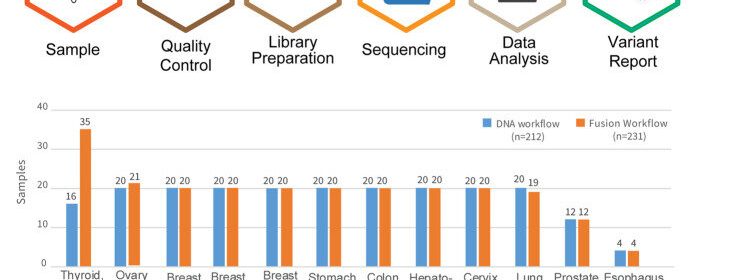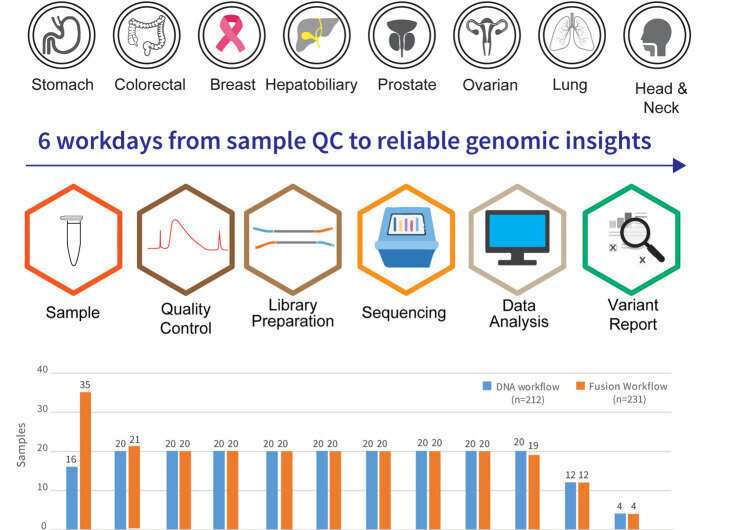Study validates diagnostic assay for Asian cancers

A Singapore research team of clinicians and scientists has validated a cancer diagnostic assay designed with Asian-centric biomarkers that aims to enable early diagnosis and timely treatment delivery. These findings, published in the journal Frontiers in Molecular Biosciences on September 21, 2022, supports the assay’s use for making critical diagnoses and well-informed therapeutic decisions for Asian prevalent cancers.
Cancer is the leading cause of death worldwide, accounting for nearly 1 in 6 deaths. Asians make up 60% of the world’s cancer burden and were 5.8 out of the 10 million cancer-related reported deaths in 2020. Early diagnosis and treatment has been proven to be key to improving outcomes for cancer patients.
With greater knowledge of how genetics can drive cancer development, the use of molecular diagnostic assays to diagnose and predict patients’ prognoses has also increased. Most of these tests are developed using biomarkers and genetic data from Western Caucasian populations, leaving an unmet need for assays that take into account the genetic, lifestyle and environmental diversity of the Asian population.
To address this gap in knowledge, a collaborative research team led by the National Cancer Center Singapore (NCCS) together with A*STAR’s Diagnostics Development (DxD) Hub, Singapore General Hospital (SGH) and precision oncology company, Lucence, developed an assay coded with 572 Asian-centric cancer biomarkers and recurrent mutations, as well as with 71 fusion genes.
The Singapore-based team reviewed extensive literature of high-impact genomic studies on Asian cancers such as liver, bile duct and colorectal cancers with Asian cohort data to shortlist potential gene candidates.
Genes found in Asian-only cohorts from well-known genomic data banks, such as The Cancer Genome Atlas Program and the Internal Cancer Genome Consortium, were also shortlisted. Genes that had clinical relevance, such as those targeted with FDA-approved drugs, used in clinical trials, were prognostic in nature or prevalent in Asians were also included in the assay’s design.
The team conducted a series of analytical tests to validate the assay to ensure it met safety and regulatory requirements for use as a lab developed test.
The assay was tested for precision, sensitivity, limits of detection, performance and benchmarked against other assays. This was done by sequencing more than 200 tissue samples taken from patients with 12 Asian-prevalent cancers with high incidence and mortality in Asia, including stomach, colorectal breast, lung, biliary tract, liver, cervix, ovary, head and neck, prostate, nasopharynx, and esophagus cancer.
Results showed that the assay’s results were highly reproducible, specific and sensitive. The assay’s performance was validated with clinical specimens, indicating its promise for reliable deployment in a clinical setting.
“The validated assay has the potential to help guide oncologists’ choice of targeted therapy to improve survival rates and enhance quality of life for their patients through personalized medicine,” said senior author of the study, Professor Teh Bin Tean, Deputy Chief Executive Officer (Research), NCCS. “The development and rigorous validation of this assay was made possible with the successful collaboration between public health institutions and commercial entities.”
“As the national platform for diagnostic development, DxD Hub strives to develop diagnostic solutions to meet the needs of patients in Singapore and the region. The outcomes from our partnership underscore our continuous effort to position Singapore as a center of excellence for precision medicine,” said Dr. Weng Ruifen, Deputy Chief Executive Officer and Chief Technology Officer of DxD Hub.
“As an oncologist, I look forward to using this assay to drive clinical decision-making and offer more personalized, targeted and effective therapy for our patients in Asia,” said study co-author Clinical Assistant Professor Chan Yong Sheng Jason, Consultant, Division of Medical Oncology, NCCS.
“Having a globally competitive home-grown cancer testing platform such as UNITED (Tissue500) is a breakthrough for Singapore,” said co-author Dr. Min-Han Tan, Founding CEO & Medical Director at Lucence. “This will enable the local ecosystem to advance patient care and drug development on a platform built specifically for Asian cancer patients.”
Source: Read Full Article
